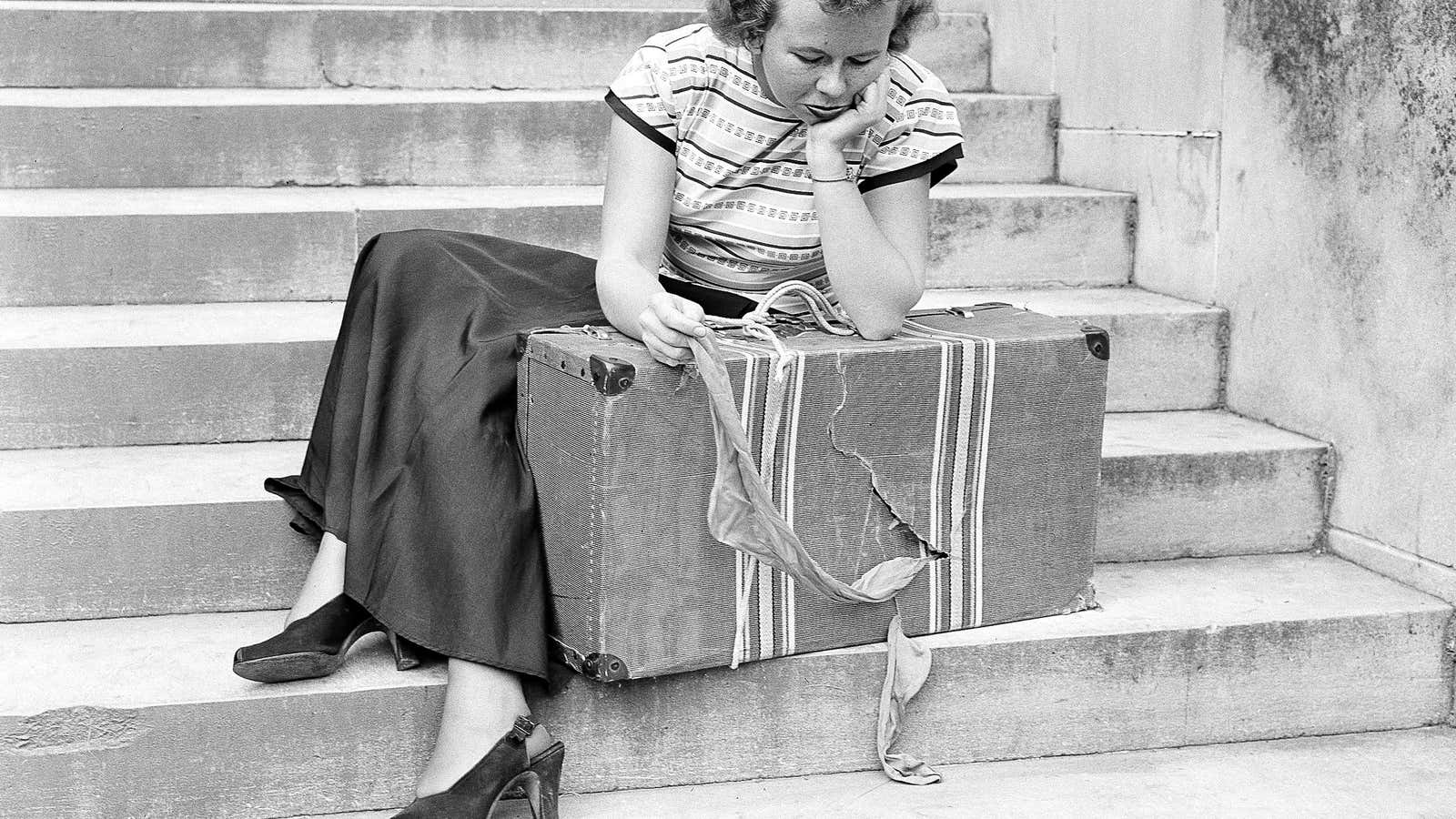This is a story of a stupid mistake.
In 1922, Ernest Hemingway was working on a temporary newspaper assignment in Lausanne, Switzerland. Journalism was his day job; at night, he wrote fiction, the thing he cared about most in the world. He was 23 years old. None of his fiction had ever been published. He and his then-wife, Elizabeth Hadley Richardson, lived in Paris, as did F. Scott Fitzgerald, Ezra Pound, and many other American expatriate artists hoping to become something big.
Hemingway asked his wife to join him in Switzerland for Christmas. She was sick at the time, and she packed her luggage the way you do when you’re sick: in a haze, forgetting useful things you need and throwing in extra stuff that you don’t. She knew how valuable her husband’s work was to him, and so she packed that, too. Every manuscript, every draft, all the handwritten notes for future novels, even the carbon copies, all went into one suitcase. One single suitcase.
At Gare du Lyon, a porter loaded her bags into her compartment. And then, just before the train left, Richardson—who was still under the weather, and had an eight-hour journey ahead of her—dashed quickly into the station to buy some water for the journey. When she returned, one suitcase, the suitcase containing every piece of fiction Hemingway had by that point produced, was gone.
Hemingway didn’t believe his tear-stained wife when she stepped off the train and told him the news. He left Richardson in Lausanne and took the train back to Paris to see for himself.
This piece of Hemingway lore was told again recently on the writer Shane Parrish’s Farnam Street blog. Parrish writes frequently about how people think, and the processes that lead to smart (and not-so-smart) decisions. As he’s written before, intelligence alone is an insufficient guard against poor judgment. Factors like stress and fatigue can hijack decision-making so that even intelligent people do the unthinkable.
For example: Every year, children die in hot cars after being forgotten in their car seats by their parents—loving, responsible parents who are undone with remorse upon realizing what has happened. For all the judgmental huffing from people who believe they’d never make such a mistake, neuroscience has made clear that virtually anyone with a brain is at risk of this tragic lapse. Stress or unexpected events can hijack the sophisticated reasoning that normally takes place in the hippocampus and prefrontal cortex. An alarming phone call can disrupt a parent’s neurological organization system long enough for them to drive straight to work, forgetting that they’ve missed the crucial step of dropping a child off at daycare. When you realize that our brains are capable of errors of this magnitude, a briefly neglected suitcase seems relatively painless.
In hindsight, Parrish writes, the stage for Richardon’s error was set before she even left for the train station. “She was outside of her normal environment. She was rushing. She was ill. Each of these things on their own can increase the odds of committing an act of stupidity,” he wrote. “Combined, they meant she was significantly vulnerable to errors in judgment.”
I found Parrish’s blog while sadly clicking around the internet in the aftermath of my own stupid error.
The previous evening, in an attempt to free up hard drive space, I dragged a folder into the desktop trash and emptied it. I thought this folder contained only old files I no longer needed. Within minutes, it became clear how wrong I was.
I’d deleted a draft of a story I’d labored on painfully. I’d deleted a document containing three days’ worth of notes from a recent conference. After hours of disk scanning and recovery efforts and assistance from an extreme patient colleague, there was no arguing—it was all gone.
“I remember what I did in the night after I let myself into the flat and found it was true,” Hemingway wrote in the memoir A Moveable Feast of the moment he realized what he’d lost. I can’t speak for the hard-drinking, hot-tempered Hemingway, but I know I cried. I stared sadly off into space for a while, and I thought of several florid, unprintable descriptions for how very stupid this mistake was.
In retrospect, I was in prime shape to make bad decisions when I sat down at my computer. I was jet-lagged and sleep-deprived, having returned late the night before from the aforementioned conference. I wasn’t ill, but my son was, and I’d taken the day off to care for him, and was worried about his health and about falling behind at work. When I finally sat down at my computer in the evening, I had approximately one hour to complete a day’s worth of work. It was a frustrating mistake, but not a tragic one—and to be honest, they weren’t Hemingway-quality drafts anyway.
Mistakes can even have value. With the pressure on to rebuild his body of work, and without the language of his earlier drafts to refer to, Hemingway, Parrish notes, started writing differently—shorter, terser, placing greater value on every word choice. The loss shaped him as a writer, and while his marriage to Richardson didn’t survive, his voice certainly has.
